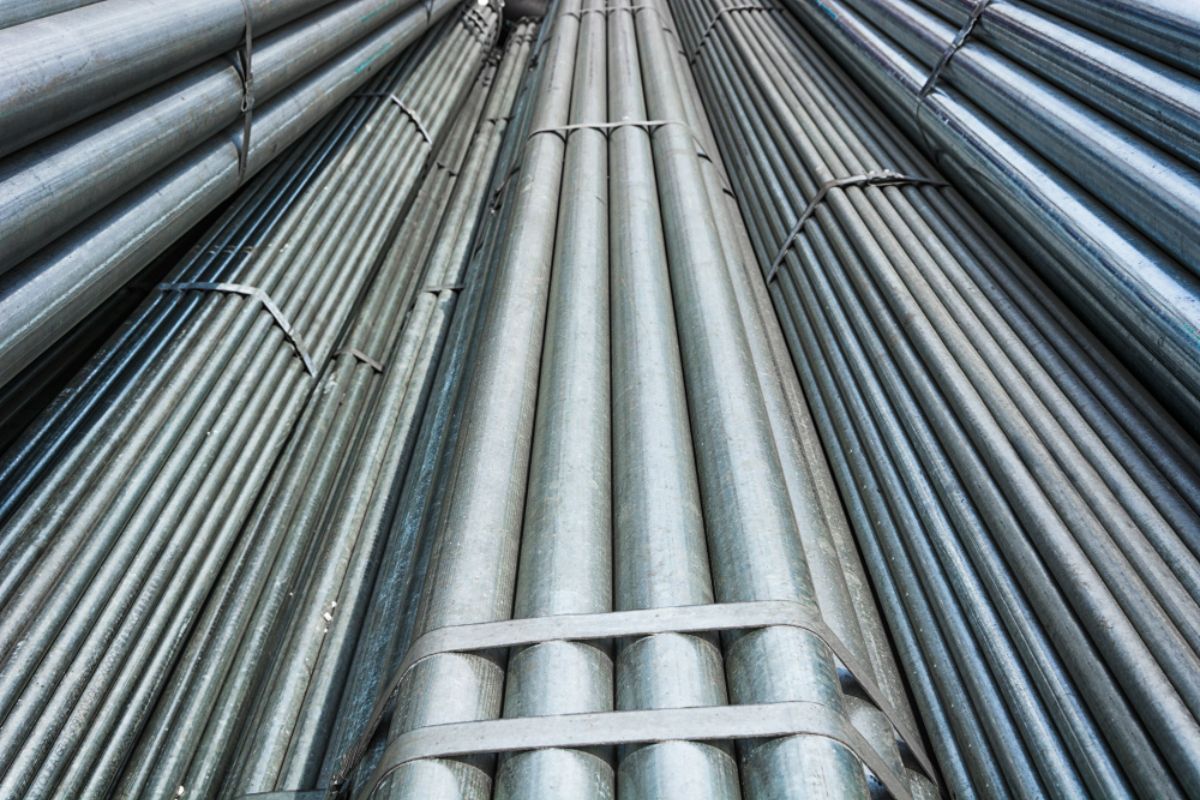What steel products are used by energy industries?
- Structural Steel
- Pipes and Tubing
- Sheet Metal
- Rebar
Overview
- Steel is a crucial material in the energy industry, providing strength and durability to large-scale energy projects.
- Structural steel supports power plants, substations, and transmission towers, ensuring efficient construction and safe infrastructure.
- Steel pipes and tubing are vital in transporting oil, natural gas, and other vital fluids, facilitating energy resource production, transportation, and distribution.
- Sheet metal is highly versatile and essential for fabricating enclosures and equipment housings that protect sensitive energy equipment from harsh environmental conditions. Additionally, rebar reinforces critical structures, ensuring the long-term integrity of energy facilities.
As a key material for industrial construction, steel brings unmatched strength and durability to large-scale energy projects. From initial planning to long-term operations, steel products used by the energy industry form the backbone of power generation, transmission, and distribution worldwide. Whether it’s wind turbines, natural gas pipelines, or electrical substations, steel enables resilient and cost-effective infrastructure solutions. Its conductive properties allow energy transmission over vast distances through structures like transmission towers and underground cables.
The diverse steel applications within the energy sector extend from supporting colossal power plants to linking far-flung communities. Nuclear reactors depend on specially engineered steel alloys to construct thick-walled pressure vessels that withstand extreme temperatures and force. This article delves into the heart of the matter, exploring the top steel products that are the lifeblood of the energy industry. From providing the skeletal framework for colossal structures to channeling vital resources through its veins, steel drives the energy sector’s growth and resilience.
Structural Steel
In power plants, structural steel provides the strength to bear heavy equipment and withstand extreme conditions. Its load-bearing capabilities, resilience, and efficient construction make it an ideal choice. Similarly, structural steel offers structural integrity and flexibility in substations for accommodating changes in energy demands. It enhances safety by protecting critical electrical infrastructure. Transmission towers also rely on structural steel’s height, strength, and design flexibility to carry power lines across long distances.
Iconic energy structures such as the Burj Khalifa in Dubai and the Gateway Arch in St. Louis demonstrate the significance of structural steel. The Burj Khalifa, with its 828-meter height, utilizes a structural steel framework to support power-generating wind turbines. The Gateway Arch showcases the role of steel in shaping the United States energy landscape, featuring stainless steel cladding supported by a structural steel framework. These examples highlight how structural steel provides the necessary support and contributes to the functionality and aesthetics of energy structures.
Pipes and Tubing

Steel pipes and tubing are integral to the energy sector, serving as lifelines for transporting oil, natural gas, and other vital fluids. These sturdy and durable materials play a crucial role in various stages of the energy production process. During extraction, pipes withstand harsh conditions and high pressures, allowing for the safe and efficient removal of valuable resources from beneath the Earth’s surface. In the transportation phase, they form extensive networks of pipelines that span long distances, ensuring the reliable and cost-effective delivery of energy resources.
To add to that, steel pipes are also used to construct infrastructure such as refineries, storage facilities, and distribution centers, facilitating the widespread distribution of energy.
Sheet Metal
Sheet metal is a highly versatile and essential material in the energy industry, offering a wide range of applications due to its remarkable flexibility. This material excels in fabricating enclosures, cabinets, and equipment housings that are crucial for the functioning of energy systems. Its adaptability allows for easy shaping and customization, making it an ideal choice for constructing energy equipment with specific requirements.
One primary advantage of sheet metal is its exceptional strength and durability. This enables it to safeguard sensitive energy equipment from harsh environmental factors such as extreme temperatures, moisture, and physical impact. Using sheet metal enclosures, critical components remain protected and can continue functioning optimally in adverse conditions. And not just that, sheet metal also possesses excellent electrical conductivity, making it highly suitable for electrical equipment housing and grounding purposes. It aids in preventing electrical interference and ensures the safe operation of energy systems.
Rebar

Rebar, short for reinforcing steel bars, is important in constructing energy infrastructure by providing strength and durability to various components. It is primarily used to fortify foundations, retaining walls, and other critical structures that form the backbone of energy facilities.
Case studies have demonstrated the significance of rebar in securing the long-term integrity of energy facilities. For instance, in earthquake-prone regions, rebar-reinforced foundations have proven vital in minimizing damage and maintaining operational efficiency during seismic events. Also, in areas susceptible to high winds and hurricanes, rebar-reinforced structures have withstood extreme weather conditions, ensuring an uninterrupted energy supply.
This steel product is an indispensable material in energy-related construction. Its use in fortifying foundations, retaining walls, and critical components provides the strength and resilience for energy infrastructure to withstand various challenges, be it heavy loads, environmental stresses, or natural disasters. Using rebar ensures energy facilities’ long-term integrity and reliability, making it essential to secure future energy infrastructure.
Key Takeaway
Steel products used by energy industries serve as the foundation of energy infrastructure, providing strength, durability, and reliability. It is important to highlight the important role of steel in supporting the operations and growth of the energy sector.
Regan Industrial Sales Inc. provides the specialized steel products and custom fabrications that enable these complex systems. We invite you to explore our website’s resources on serving energy sector needs. Contact our team today for guidance on procuring the right steel solutions for your next project.






